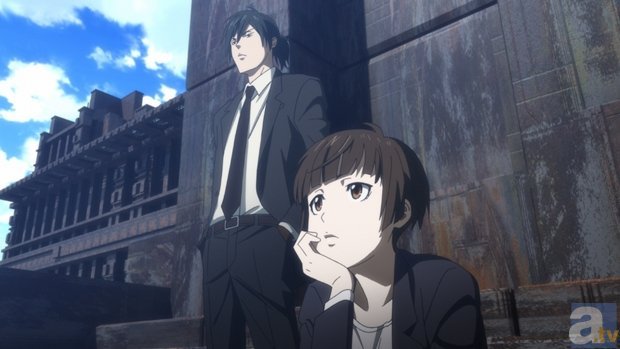Psycho-Pass:
The Movie (Gekijoban Psycho-Pass): Written by Gen Urobuchi and Makoto
Fukami, directed by Katsuyuki Motohiro and Naoyoshi Shiotani. Starring:
Kana Hanazawa, Kenji Nojima, Shizuka Ito, and Ayane Sakura. Running
time: 113 minutes. Based on the
anime of the same name.
Rating: 2/4
It’s the future (isn’t it always?),
and Japanese society is now overseen by the AI Sibyl System, a
computer program that detects and analyses potential criminal threats before
they even happen, allowing the police to rush in and take out whoever the
computer determines to be a future threat to society. Since the system has worked so well in Japan,
the government is now exporting it to surrounding nations, including several in
Southeast Asia that are engaged in internal civil conflicts. Our movie begins with a raid by a police
force team led by Akane, which stops an exchange of arms. However, things turn personal for the squad
leader after they learn that the group they stopped was sent by a former
teammate of hers, Shinya, who went AWOL years earlier and is now known to be leading an armed resistance
within one of the nations that utilizes a prototype version of the Sibyl
System.
With the stakes for her now very
personal, Akane is sent in under cover to find Shinya’s hideout and determine why
he’s turned into a rebel leader. Along
the way, she also has to deal with a team of elite hit men (and one woman) sent by the local government to take Shinya out, and a cadre of corrupt military officers who may or may not
be subverting the Sybil System for their own greedy purposes.
The anime-series roots of Psycho-Pass crop up early on in the
film. No time is spent on introducing
the characters of the team, whose relationships to each other and character
archetypes can only be gleaned in passing.
One of the smaller members on the team appears only in the beginning and
again at the end to establish that he has a personal grudge against Shinya. The movie is expertly animated and
the fight scenes are slick and fun- an early combat scene in a bombed-out shell of a city deserves special praise- but it’s clear that any deeper enjoyment or
understanding of the stakes can only be had if you already know the anime. This is no statement on the quality of the anime-
for all I know, it could be brilliant- but it does mean that Psycho-Pass falls as short as most
series-movies do in terms of working as a stand-alone feature. It doesn’t bore for a minute, but neither
does it ever stop to let itself rise above its serial origins.
There are efforts on the film’s part
to inspire thought about the broader messages of the world it creates. The Sibyl System itself is an obvious focal
point for discussions of the pros and cons of Orwellian surveillance systems, but
instead of trying to visualize or scatter topical discussion about it, we just
get a closing, moralizing monologue from Akane to the central mainframe for the
program about needing to respect the development of human history. Like I said, I can imagine that
this gets better face-time in the anime, but here, it comes across as
forced. Casual anime fans should not be
dissuaded by my rating from seeing this one, but just go in with the awareness
that, fast-paced as it is, Psycho-Pass
does not wait for anyone to catch up.
-Noah
Franc

No comments:
Post a Comment